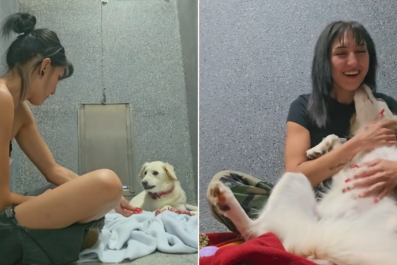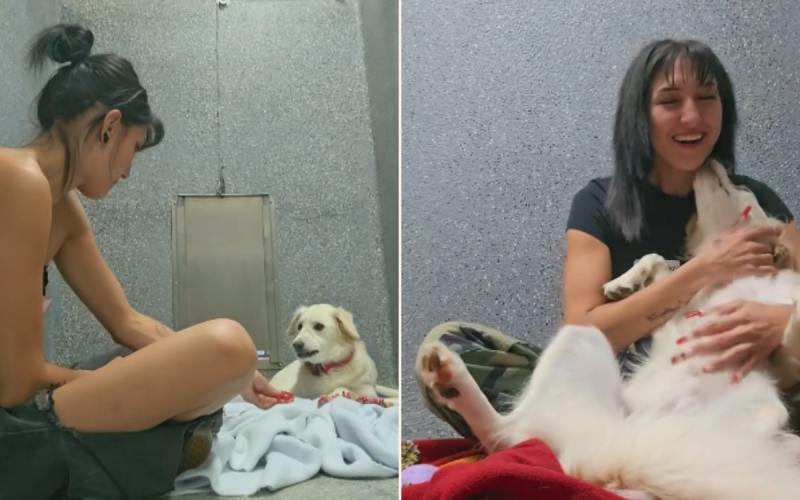
Shelter Dog Returned for Biting Transformed by Volunteer's Love: 'Crying'
A shelter dog who was returned for biting underwent a remarkable transformation, thanks to the care and attention of a volunteer.
Amie Addington shared footage to TikTok under the handle @themagic.dragon, showcasing the difference she has seen in the way a dog by the name of Emmanuel has behaved since she started visiting him.
Emmanuel resides at the Valley Animal Center in Fresno, California. "He was adopted from the shelter as a puppy and then returned for biting," Addington told Newsweek. "I'm not sure exactly about his life before but the staff has said that it doesn't seem like he was socialized at all which is why he was terrified of everyone."
More From Newsweek Vault: The 10 Cheapest Pet Insurance Plans
Dog bites are a serious matter, with the Centers for Disease Control and Prevention estimating that close to one in five people bitten by a dog proceed to require medical attention.
It's important to stress that the majority of dog bites occur when the canine involved is scared, nervous, eating or playing with either toys or puppies. Emmanuel certainly fell into this category.
Addington said that Emmanuel really struggled with people when he first arrived at the shelter. "He would show teeth and growl because he was scared of anyone coming near him," she said.
It took time and patience for the shelter pup to get used to having Addington in his personal space inside the kennel. In the video she posted to social media, Emmanuel can be seen bearing his teeth at Addington. That eventually changes though.
More From Newsweek Vault: Compare Top Pet Insurance Plans For Dogs
"The first four days I sat with him for about four hours each day and since the third day he hasn't growled or anything," she said. By the end of the video, Emmanuel can be seen cuddled up to Addington. It's clear she has won his trust.
Commenting on the video, one dog lover commented, "he feels safe with you," while another was "crying" at witnessing the change.
More From Newsweek Vault: The Top Rewards Credit Cards for Pet Owners
Addington is keen to stress that she doesn't have a set blueprint to success when it comes to helping dogs of this kind.
"I really just had to be patient with him and read his body language when he needed space. I'm not an expert and he's the first dog I've done this with so I was learning too," she said. "I did research and read about reactive and anxious dog behaviors so that I could help him and other dogs better."
A lot of it came down to simply sitting with him and keeping him company. "I gave treats when he'd come to me and tried not to make too much eye contact," Addington said. "Showing him I wasn't going to hurt him."

Those efforts have made a world of difference, with Addington overjoyed at the way Emmanuel has "come out of his shell."
"He plays with toys now and he loves the floppy ones that he can throw around," she said. "Emmanuel is very vocal and sounds like a flute when he does his happy cries."
Addington feels that Emmanuel living in a shelter has hindered his progress on some level, simply because of his aversion to being there.
"He still struggles with the shelter and when I take him outside on a leash he will pace back and forth trying to find his way out of the gate," she said. "It's really heartbreaking. I feel like so many of them would be completely changed animals if they were just able to get out of there and get some peace and quiet."
Research supports her assertion. A 2006 study published in the journal Physiology and Behavior found dogs entering a shelter on average had around three times the level of the stress hormone cortisol in their system over their first three days there than normally domesticated canines.
Emmanuel is still nervous around dogs and probably isn't the kind of dog that would be good with a family that has kids, but Addington's video shows he's capable of living a happy life with the right special someone. He just needs to find them now.
